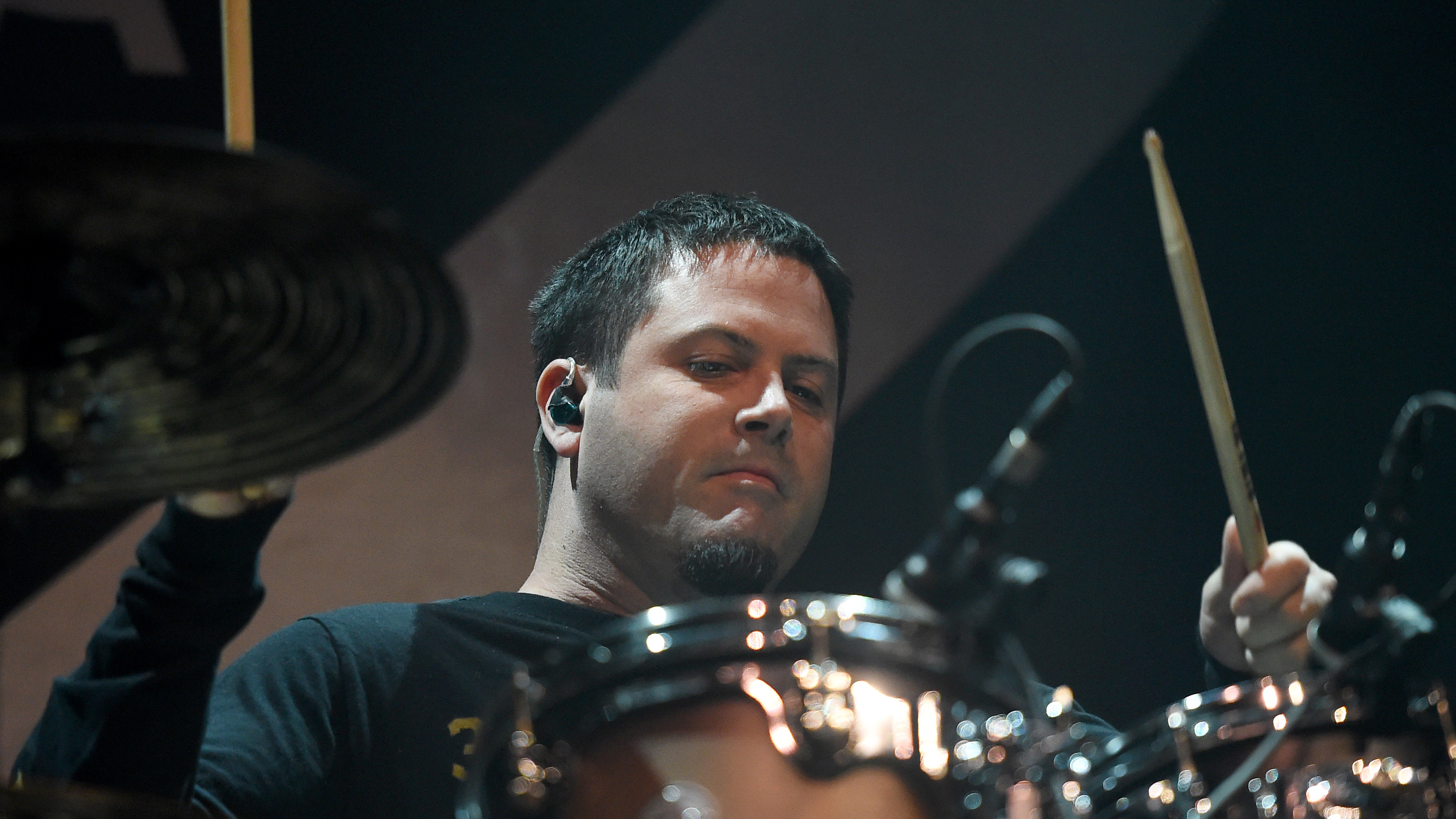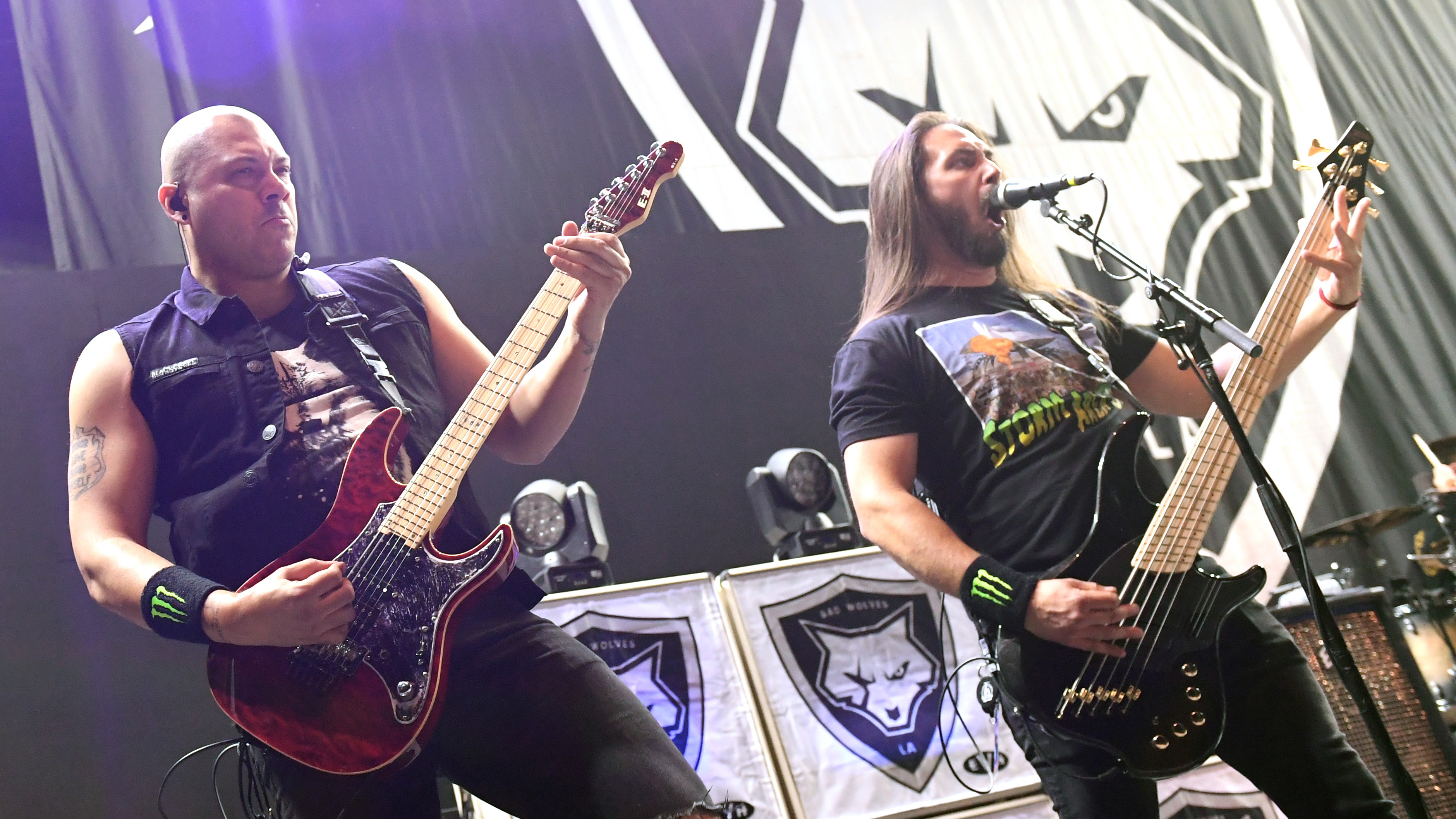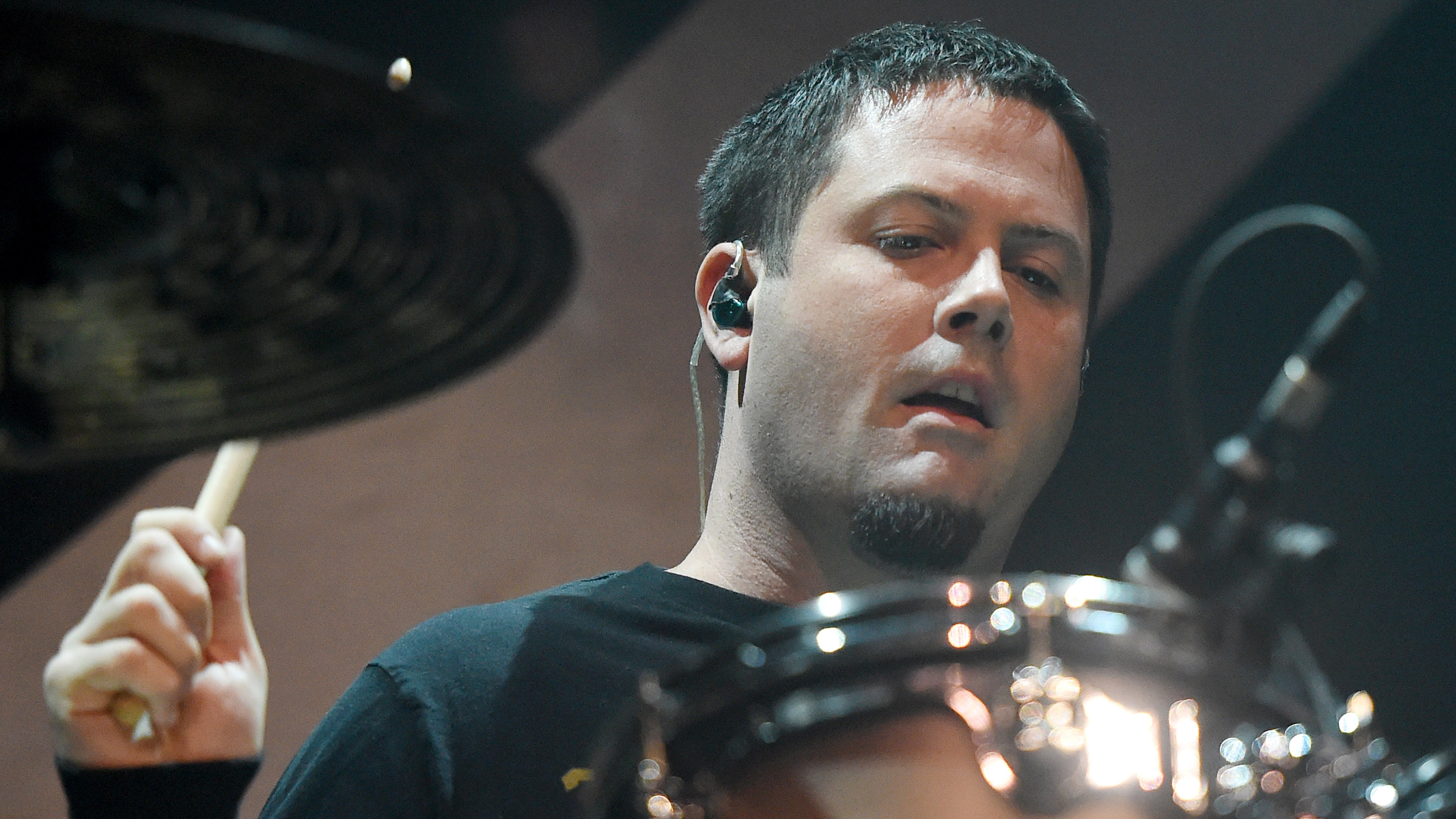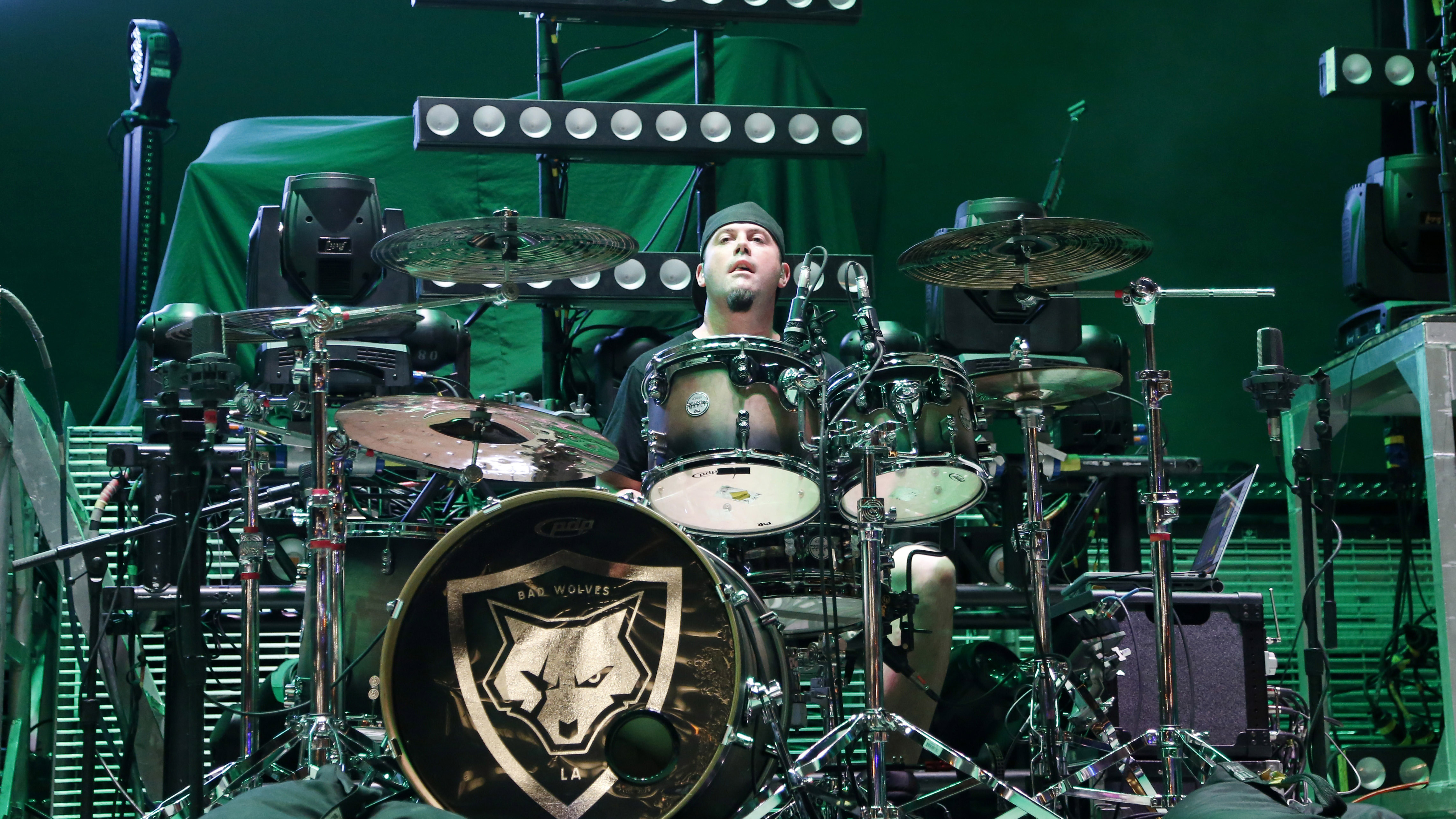"I now understand drums in such a different way" – Bad Wolves' John Boecklin talks going back to basics
The former DevilDriver drummer spent two and a half years relearning his craft with renowned tutor David Elitch

As drummer, songwriter, and producer for Bad Wolves, John Boecklin wears many hats. While he’s willing to take credit for his responsibilities, he’s quick to note that he doesn’t do it alone. Bad Wolves, he says, is a collective effort — even more so on their new album, N.A.T.I.O.N.
Boecklin grew up in Needham, Massachusetts, where he began his musical journey on acoustic guitar. His direction changed upon hearing Metallica, and soon he was well versed on electric guitar and drums, the latter becoming his primary instrument, although he still turns to the guitar as his songwriting tool.
He relocated to California and spent over a decade with metal band DevilDriver. After leaving that band in 2014, he began laying the groundwork for what became Bad Wolves, where he is now joined by vocalist Tommy Vext, guitarists Doc Coyle and Chris Cain, and bassist Kyle Konkiel.

His career overhaul involved far more than assembling a new band. He spent two-and-a-half years under the tutelage of renowned drummer and instructor David Elitch, formerly of The Mars Volta, who began by taking him back to the foundations — posture, breath, stick position, and attack. His drums also changed: he downsized to a five-piece PDP/DW kit with one kick, two rack toms, a floor tom, and a snare.
Bad Wolves released their debut album, Disobey, in 2018, and soon found themselves holding the top spot internationally with their cover of The Cranberries’ Zombie.
It felt like I had started playing drums again from square one
When it was time for a new album, songwriters and co-producers Boecklin and Vext were determined to push the band lyrically and musically. The result is N.A.T.I.O.N., released on October 25.
Like its predecessor, it received immediate airplay and impressive chart positions worldwide. The group embarked on a U.S. tour with Five Finger Death Punch and Three Days Grace, and will cross Europe with FFDP and Megadeth at the start of the new year.
Want all the hottest music and gear news, reviews, deals, features and more, direct to your inbox? Sign up here.
Boecklin connected with MusicRadar to discuss his writing and recording techniques, and how becoming a student again vastly improved his playing.
What prompted your decision to take lessons with David Elitch?
"After DevilDriver, I felt my creativity had peaked. When I went to David, it wasn’t what I expected. His Bruce Lee way of teaching — he breaks you down, back to the beginning, so I had to restructure and change my technique. It felt like I had started playing drums again from square one.
"The exercises were so mundane and simple, but I needed to do them to be able to go past where I was. A lot of the work was done at home on a pad to get the basics down. It was tough. It was a long two-and-a-half years. I now understand drums in such a different way. I can watch people do technical things and understand what’s going on. I have a different feel, and I learned so much more about the instrument in those two years than I ever have."
Would you recommend lessons to all drummers, regardless of skill level and experience?
"Yes. Dave gives lessons to some of the greatest drummers in the world, and what he did with me is what he does with them. He works on your posture, your breathing, your technique. He makes sure you’re on the right path and helps you get rid of old habits, bad habits. That takes extreme amounts of repetition after you’ve been playing drums a certain way for years. It’s very hard to change.
"Even simple things, like with your kick drum. Some people hit the kick drum and let their foot rest and play through the drums. You’re supposed to strike it and release. I was playing through with my hands and feet, not working the physics of drums, like working with the drum. I was working against it.
"My grip was very tight. That took almost three years, and I’m still working on it: letting the sticks do the work and not my hands and biceps. My technique was, as Dave would call it, one of the worst he’s ever seen. It was a very bright moment for me when I went for a check-up and he said, “I don’t say this very often, but your hand technique is perfect.”
How often do you go back to him? Are you still following an exercise routine?
"Yes. He’s given me plenty of exercises that I go back to that keep up the methodology of what he teaches. I try to get in with him here and there, but my schedule with Bad Wolves is so busy. So I think about some of the stuff he’s done and always keep that in mind.
"Every show I play, I think about Dave watching me. I remember that I’m slouching and I sit up, work on my breathing, and stuff like that. One day I’ll make him proud! I will say that without Dave Elitch, I don’t know that I would have held up my end of the bargain on drumming as I am now."
You started playing at 14. Did you take lessons at that time?
"I took lessons for a few weeks when I was a kid, and although it was fun and it kept me engaged, the teacher failed to show me the mechanics. There are so many rudimental things that he didn’t force me to do, and which I had no interest in doing at that time and at that age. I wanted to learn Slayer songs and that’s it. So I missed a lot of key crucial things.
"The word 'regret' doesn’t come up, but I get mad that I didn’t understand those things, because I would have been ten times the drummer that I am right now if I had gotten into this stuff earlier."
How did studying with Dave help you as a songwriter?
"I’m at a place of technicality where I can do more than I ever have been able to do, but that doesn’t necessarily mean that I flash it and do it on a record. So it might make the writing process more complicated because I always have been a bit of an over-player.
"When I was in DevilDriver, the music called for it, while this music doesn’t. But I don’t find it a challenge to hold back. I find a sense of ease and relief knowing that I don’t have to play something extra-complicated, because that’s not what rock is — although at times it can be.
"There’s a song on this album called I’ll Be There. I wrote that drumbeat based off of a paradiddle permutation sheet that Dave gave me. I go from right hand to switching to left-hand leads and it’s pretty tricky. I wrote that drumbeat, which then brought the song to life. That’s a case where the lessons I took and stuff I learned directly became part of the songwriting process, but that’s not usually where things start for me."
Where do things start for you? What is the songwriting process for Bad Wolves?
"I’ve always loved writing music. That’s where it started for me, and the process has not changed. It’s usually just me, in my room, working on an idea.
"Most of our record was done in Las Vegas with Max Karon, who I originally started the band with, so our chemistry is very strong. He is the engineer and records all the guitar and bass, and sometimes plays guitar. I come in with a riff and we start from there. We usually take two or three days per song, ten-hour days. We love buckling down and working hard. I bring the songs to Tommy and the band, they make suggestions, Tommy sings on it, and then we realize if we have a song or not, or does it need more.
"Back In The Days started with a riff I wrote in 2013 on tour with Trivium. The chorus riff was a folksong I wrote five years ago that sounded like Jimmy Eat World meets Mumford & Sons that I simplified and made more straightforward rock. Those were the ideas, and I never let ideas die. They sit around in my back pocket until I can find a way to use them.
"Doc brought a song called Better Off This Way. He sent it to Max and me, and he had an acoustic version and a heavy version, so we took both of those worlds and combined them. That was a new process for the band — someone bringing in two complete pieces of work and we made it one."
I have no attachment to what I do, which makes me a good producer for my own stuff
How do you define your role as producer, or co-producer with Tommy, in Bad Wolves?
"I’ve never walked around saying, 'I’m a producer', but that’s the role I take in the studio. I feel comfortable making big decisions, quick decisions, 'Let’s do this', 'Let’s cut this out here', 'I don’t like that tone', 'Let’s move forward here'.
"Some people cannot get past certain questions; because they wrote the song, it’s hard for them to look at it from an outside perspective and cut or change things. I have no attachment to what I do, which makes me a good producer for my own stuff.
"I am not proficient in technology. I am not the guy running Pro Tools. That’s the engineer’s job, although I’ve worked with producers who do both. DevilDriver did an album [The Fury of Our Maker’s Hand, 2005] with Colin Richardson, who’s such a big producer. He didn’t touch the computer, he didn’t work with the board, he was more there as a coach. And I am a coach producer.
"Max engineered the guitars and bass at his studio in Las Vegas. Joseph McQueen mixed the record, tracked all the vocals, and helped with a lot of synths and loops that are tucked into songs. Mark Lewis, who I’ve worked with for years, mixed a lot of our first record, and on this one he did the drums in Nashville."

Were you there for the entire process?
"I was there for 95 percent of it. Obviously I was there when we tracked drums, I was there for guitars and bass, and I was there for most of the vocal tracking. I’ve learned that it’s better to let Tommy get on his way before I start interrupting the process, because my brain starts firing so much when he’s in the vocal booth that I start cutting him off and 'Why don’t you try this … why don’t you try …'
"As a drummer, that’s happened to me, and at some point you’re like, 'Dude, why don’t you just shut up and let me do my job and then we can talk about it.' So I let him get a bit of the vocals done, and then I assess and throw suggestions around. Sometimes there’s a lot to be said, and other times there’s nothing to be said."
It’s knowing when to get out of the way.
"Absolutely, and a lot of people don’t understand that. I’ve been told that I’m hard to work with because I’m a workhorse and I get disappointed when people get burned out.
"It’s taken me a while to learn that 'OK, that was a five-hour session, and that’s good enough for today. Let’s all relax,' because I have a hard time sleeping until something’s done. It’s easy to get excited and want to get all my thoughts out, but you have to let someone get their body of work done and then you can grade the paper."

How did you cultivate that skill?
"I’ve always been patient. I used to work with autistic and severely emotionally disturbed kids. I’m not relating that creatively, but I had to be the most patient person to work with them. That’s where I learned the skill.
"I learned how to psychologically make the room work, to not be above or below anyone, to run the ship without feeling like a boss, and let someone else run the ship and not feel discouraged about it or feel like I’m not getting my say. It’s a dynamic that you have to work on and it starts with yourself.
"I also have a lot of confidence in terms of songwriting. So when someone takes away my idea, I’m not crying about it in the corner. I’m looking at it from a logical standpoint and 'Can I accept that I disagree with them, but they win?' Yes. If I truly believe in something, I’ll fight for it, but pick and choose your battles. It’s very wise and you’ll go further."
When did you work with autistic children?
"When I was 20 to 22, at a 24-hour facility in California. There were adult and children’s programs, and they were extreme cases that required full-time care. The turnover rate of employment — people would leave after two days.
"You spend months teaching them their ABC’s or getting someone to brush their teeth. A friend of mine who became the bass player in DevilDriver worked there and suggested it to me, and I was there for two years. It was one of the most rewarding experiences of my life because I gained so much compassion and I learned so much about relationships and solving problems."

You mentioned patience and compassion. Clearly, there is also a sense of self and a lot of drive.
"I’m an example of someone who did the work, and with that, you can completely change and become better. You either do it or you don’t. It’s that simple. It’s up to you to hold yourself accountable, do what it takes, and be self-aware.
"If you really care about what you’re doing, it doesn’t feel like a job, but mind you, it’s tedious. Dave only scratched the surface with me. I have a lot more work to do to get to where I would feel comfortable calling myself a real drummer in the leagues that he plays in.
My goal is to be a songwriter, a producer, and in a band
I’m nowhere near that, and I’m completely comfortable with it, because my goals are not to be a teacher doing drum festivals and being looked up to for the craft. My goal is to be a songwriter, a producer, and in a band, so I won’t take the extreme it takes to get there because that’s not my end game.
"I take things seriously, but I have other things on my table in terms of songwriting. That’s not an excuse. That’s doing what I want to and taking my drums as far as I want to. I know who I am and what I want. I have goals, I go after them, achieve them, set the next goals, and go after those too. You can always go further, but I’m happy now. I learned a lot from Dave about my boundaries and how far I can extend them."
John Boecklin's gear

Drums
PDP Concept Maple in Satin Charcoal Burst
18” x 22" kick
8” x 10" rack tom
9” x 12" rack tom
14” x 16" floor tom
6” x 14” PDP Concept black nickel over steel snare
Heads
Remo Drumheads
Kick
Clear Powersonic batter
Ebony Ambassador with custom Bad Wolves decal
Toms
Clear Pinstripe or Emperor batter
Clear Ambassador Resonant
Snare
Coated Emperor X Batter
Hazy Ambassador Resonant
20-strand Puresound wires
Cymbals (from left to right)
Meinl Cymbals
14” Byzance Dark hats (bottom cymbal on top)
16” Classics Custom Dark Crash
22” Soundcaster Mega Bell Ride
18” Classics Custom Dark Crash
18” Classics Custom Dark China
Hardware
Drum Workshop
Stands
4x 9700 boom stands
1x 9900 double tom stand
1x 9300 snare stand
1x 9120 tractor throne
Pedals
1x 5500TD (2-legged) hi-hat stand
1x 9002 double pedal
Electronics
Roland TM-2 Trigger Module
Roland RT-30K Kick Drum Trigger
Mackie Mix8 8-channel mixer
KZ Ears AS10 in ear monitors
Miscellaneous
Vic Firth 5B sticks
Vic Firth Stick Caddy (mounted from hi hat)
Meinl Stick Bag (hung from floor tom)
Bad Wolves are currently touring the US with Five Finger Death Punch and will be heading to Europe in January / February 2020. For more info visit the
Bad Wolves site